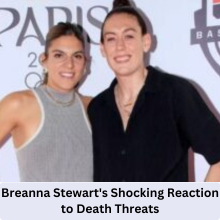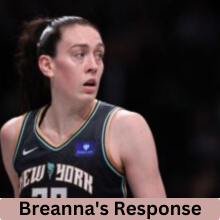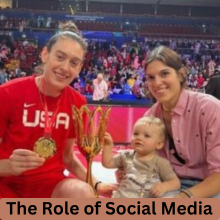
In a shocking turn of events following the WNBA Finals Game 1, star player Breanna Stewart addressed a deeply troubling issue: her wife, Marta Xargay Casademont, received a death threat that was not only alarming but also homophobic in nature. This incident underscores the ongoing challenges athletes face, especially within the LGBTQ+ community, even in leagues that pride themselves on inclusivity. Let’s dive into what happened, the implications, and the broader conversation around safety and acceptance in sports.
Background of the Incident
The Game That Sparked Outrage
On October 10, 2023, the New York Liberty faced off against the Minnesota Lynx in a highly anticipated WNBA Finals Game 1. The Liberty’s loss didn’t just affect the players on the court; it led to a barrage of hateful messages directed toward Stewart’s family. It’s a stark reminder of how passionate sports fans can sometimes cross the line into toxic behavior.
The Nature of the Threat
After the game, Marta received a homophobic death threat via email. This act of hate not only targeted her but also aimed at undermining the accomplishments of both her and her wife, Breanna. Stewart made it clear that this type of behavior is unacceptable and that it goes far beyond sports.
Breanna’s Response
Addressing the Media
In a candid interview with NBA Today on October 15, Stewart expressed her shock and anger over the threats. “It came after the Game 1 loss, and sometimes people are taking things too far,” she stated. Her emotional response highlights the pressure athletes face—not just from competition but from societal hate as well.
A Call for Awareness and Action
Stewart didn’t shy away from the need for change. She emphasized that, despite the WNBA’s reputation as “the most inclusive league in all of professional sports,” there’s still a pressing need to address racism and homophobia. “We want to make sure that not only am I using this platform, but we’re maintaining it consistently and really putting pressure on the league to keep us safe,” she said.
The Bigger Picture
Homophobia in Sports
Sadly, threats like the one directed at Casademont are not isolated incidents. Homophobia in sports, especially against female athletes, has been an ongoing issue. Even in leagues that promote inclusivity, the culture sometimes fails to protect those who are different. Stewart’s experience highlights the need for a more robust response from the league and its supporters.
Racism and Homophobia: A Dual Fight
Stewart also mentioned that this isn’t just a gay rights issue; it’s also about fighting racism. The intersection of these two forms of hate can be particularly damaging, especially in a sport that draws from diverse communities. The league must take a stand against both.
Support and Solidarity
Community Reactions
The WNBA community and fans have rallied around Stewart and Casademont. Social media has seen an outpouring of support, with many advocating for a safe environment for all athletes, regardless of their sexual orientation. This solidarity is crucial in making a statement against hate.
League’s Responsibility
Following the incident, there are calls for the WNBA and its teams to do more in terms of security and awareness. Many believe that the league must implement better measures to protect its players from threats and harassment. Stewart’s case serves as a wake-up call for the WNBA and all sports organizations.
Personal Impact on Stewart and Casademont
Feeling Safe in Their Own Lives
Breanna and Marta have taken precautions following the threats, showing that safety is a primary concern. “Myself and my family, we’re definitely doing OK,” Stewart mentioned, but she acknowledged the terror that Marta felt. It’s a reminder that threats can have lasting psychological effects.
Balancing Family and Career
As parents to two young children, the couple faces the additional challenge of ensuring their family feels safe. Balancing the pressures of their careers with the need to protect their family is no small feat. They are navigating not just the public eye but also the personal ramifications of such threats.
The Role of Social Media
Amplifying the Conversation
Social media has played a significant role in amplifying the conversation around this issue. While it can be a breeding ground for hate, it can also serve as a powerful platform for support and awareness. Athletes like Stewart are using their voices to shine a light on these issues.
Educating the Public
By speaking out, Stewart is educating her audience about the realities of homophobia in sports. This incident opens up dialogue, allowing fans and fellow athletes to reflect on their behavior and attitudes toward LGBTQ+ individuals.
Also read: Winter 2024: South Warms Up While North Gets Soaked
Future Implications
Creating a Safe Environment
Going forward, both the WNBA and its players have a responsibility to advocate for a safer environment. The league must prioritize policies that protect athletes and promote inclusivity. Stewart’s call to action is just the beginning of what could be a significant shift in the culture of sports.
Encouraging Allyship
This situation encourages allyship within the sports community. Fans, players, and organizations must stand united against hate in all forms. It’s about creating a culture where everyone feels valued and safe.
Also read: Trump Cooks Fries at McDonald’s: A Bold Challenge to Harris
FAQs
What happened to Breanna Stewart’s wife after Game 1?
Marta Xargay Casademont received a homophobic death threat via email following the Liberty’s loss.
How did Breanna Stewart respond to the threat?
Stewart spoke out in an interview, expressing her anger and calling for awareness and action against hate in sports.
What does Stewart say about the WNBA’s inclusivity?
Stewart acknowledges that while the WNBA is inclusive, there is still a need to address racism and homophobia.
How did the community react to the incident?
The WNBA community and fans have shown support for Stewart and Casademont, advocating for safety and inclusivity.
What can be done to prevent similar incidents in the future?
There is a call for the WNBA to implement better safety measures and for the sports community to promote allyship against hate.

